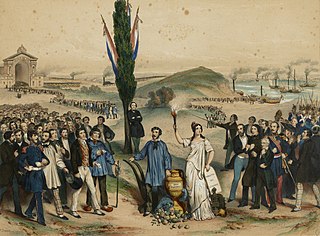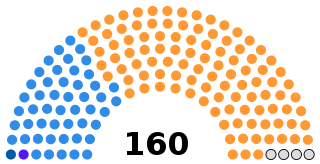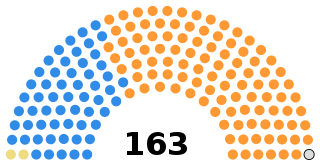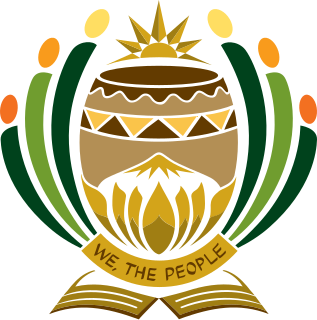
Suffrage, political franchise, or simply franchise is the right to vote in public, political elections. In some languages, and occasionally in English, the right to vote is called active suffrage, as distinct from passive suffrage, which is the right to stand for election. The combination of active and passive suffrage is sometimes called full suffrage.
The Three-Fifths Compromise was a compromise reached among state delegates during the 1787 United States Constitutional Convention. Whether and, if so, how slaves would be counted when determining a state's total population for legislative representation and taxing purposes was important, as this population number would then be used to determine the number of seats that the state would have in the United States House of Representatives for the next ten years. The compromise solution was to count three out of every five slaves as people for this purpose. Its effect was to give the southern states a third more seats in Congress and a third more electoral votes than if slaves had been ignored, but fewer than if slaves and free people had been counted equally. The compromise was proposed by delegate James Wilson and seconded by Charles Pinckney on June 11, 1787.

The Separate Representation of Voters Act No. 46 was introduced in South Africa on 18 June 1951. Part of the legislation during the apartheid era, the National Party introduced it to enforce racial segregation, and was part of a deliberate process to remove all non-white people from the voters' roll and revoke the Cape Qualified Franchise system.

Elections in South Africa are held for the National Assembly, provincial legislatures and municipal councils. Elections follow a five-year cycle, with national and provincial elections held simultaneously and municipal elections held two years later. The electoral system is based on party-list proportional representation, which means that parties are represented in proportion to their electoral support. For municipal councils there is a mixed-member system in which wards elect individual councillors alongside those named from party lists.
The Senate was the upper house of the Parliament of South Africa between 1910 and its abolition from 1 January 1981, and between 1994 and 1997.

The 1961 South African general election, held on 18 October of that year, was the first general election after South Africa became a republic following the 1960 South African referendum. The National Party under Hendrik Frensch Verwoerd won a majority in the House of Assembly.

The 1958 South African general election, held on 16 April of that year, led to a victory for the National Party, under the leadership of J.G. Strijdom, which took 103 seats in the House of Assembly. It was the first election in South Africa with a whites-only electorate, following the removal of the Cape Qualified Franchise in the late 1950s to be replaced by four (white) MPs elected to represent Coloured voters in separate constituencies.

The 1966 South African general election, on 30 March 1966, resulted in another comprehensive victory for the National Party under Hendrik Frensch Verwoerd.
The system of racial segregation in South Africa known as apartheid was implemented and enforced by a large number of acts and other laws. This legislation served to institutionalise racial discrimination and the dominance by white people over people of other races. While the bulk of this legislation was enacted after the election of the National Party government in 1948, it was preceded by discriminatory legislation enacted under earlier British and Afrikaner governments. Apartheid is distinguished from segregation in other countries by the systematic way in which it was formalised in law.
The Southern Rhodesia general election of 15 September 1948 saw the Prime Minister Godfrey Huggins regain the overall majority he had lost at the previous election. Huggins won a landslide, reducing the opposition Liberal Party to a small minority.
The voting rights of Indigenous Australians became an issue from the mid-19th century, when responsible government was being granted to Britain's Australian colonies, and suffrage qualifications were being debated. The resolution of universal rights progressed into the mid-20th century.
The Third Amendment of the Constitution Bill 1958 was a proposal to amend the Constitution of Ireland to alter the electoral system from proportional representation under the single transferable vote (PR-STV) to first-past-the-post (FPTP). The proposal was rejected in a referendum held on 17 June 1959. This was the same date as the presidential election in which Taoiseach Éamon de Valera was elected as president.
Black suffrage is Black people's right to vote. Black suffrage has been at issue in countries established under conditions of white supremacy. It may be limited through official or informal discrimination. In many places, black people have obtained suffrage through national independence. It should also be pointed out that "Black suffrage" in the United States in the aftermath of the American Civil War explicitly refers to "Black Male Suffrage". While women citizens, regardless of race, held rights to vote in some states, at the federal level, the U.S. Constitution was not interpreted to prohibit discrimination against women in voting, regardless of their race, until the passage of the 19th Amendment which was ratified by the United States Congress on August 18 and then certified by law on August 26, 1920.

The House of Assembly was the lower house of the Parliament of South Africa from 1910 to 1981, the sole parliamentary chamber between 1981 and 1984, and latterly the white representative house of the Tricameral Parliament from 1984 to 1994, when it was replaced by the current National Assembly. Throughout its history, it was exclusively constituted of white members who were elected to office predominantly by white citizens, though until 1960 and 1970, respectively, some Black Africans and Coloureds in the Cape Province voted under a restricted form of suffrage.

The Parliamentary Voting System and Constituencies Act 2011(c. 1) is an Act of the Parliament of the United Kingdom that made provision for the holding of a referendum on whether to introduce the Alternative Vote system in all future general elections to the UK Parliament and also made provision on the number and size of Parliamentary Constituencies. The Bill for the Act was introduced to the House of Commons on 22 July 2010 and passed third reading on 2 November by 321 votes to 264. The House of Lords passed the Bill, with amendments, on 14 February 2011, and after some compromises between the two Houses on amendments, it received Royal Assent on 16 February.

The Separate Representation of Voters Amendment Act, 1968 was an act of the Parliament of South Africa enacted under the government of B. J. Vorster, which repealed the Separate Representation of Voters Act, 1951. This had the effect of removing the four members of the House of Assembly who were elected by Coloured voters in the Cape Province. Subsequently the House of Assembly would be elected solely by white voters.

The Women's Enfranchisement Act, 1930, was an act of the Parliament of South Africa which granted white women aged 21 and older the right to vote and to run for office. It also had the effect of diluting the limited voting power of non-white people by effectively doubling the number of white voters. It was enacted by the National Party government of Prime Minister J. B. M. Hertzog.
The Coloured vote constitutional crisis, also known as the Coloured vote case, was a constitutional crisis that occurred in the Union of South Africa during the 1950s as the result of an attempt by the Nationalist government to remove Coloured voters in the Union's Cape Province from the common voters' rolls. It developed into a dispute between Parliament and the judiciary, on the one hand, and the Appellate Division of the Supreme Court, on the other hand, over the power of Parliament to amend an entrenched clause in the South Africa Act and the power of the Appellate Division to overturn the amendment as unconstitutional. The crisis ended when the government enlarged the Senate and altered its method of election, allowing the amendment to be successfully enacted.

A constitutional referendum was held in Zambia on 11 August 2016 alongside general elections, a move designed to reduce the cost of the referendum. Voters were asked whether they approve of proposed amendments to the bill of rights and Article 79, which dictates the process of future amendments.










